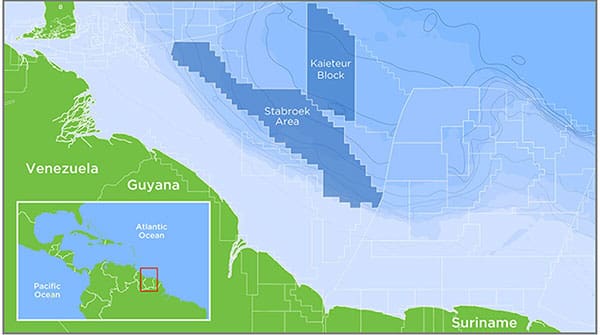Guyana is under the international spotlight as Venezuela threatens to invade and Exxon and Chevron skirmish over control
 Guyana, South America’s newest oil-producing nation and its growing oil assets, is under the spotlight – and not necessarily for positive reasons. As is often the case with such valuable assets, geopolitical interests are starting to emerge.
Guyana, South America’s newest oil-producing nation and its growing oil assets, is under the spotlight – and not necessarily for positive reasons. As is often the case with such valuable assets, geopolitical interests are starting to emerge.
Guyana’s offshore oil sector is booming, with discoveries totalling over 11 billion barrels of oil equivalent. Production is set to hit approximately 620,000 barrels per day (bpd) once the Payara field is fully operational, with projections reaching beyond 1.2 million bpd by 2028. To date, there have been 30 significant discoveries, with more anticipated.
With the expected start of production at the Yellowtail site in 2025 and Uaru in 2026, Guyana’s daily output could potentially reach eight million barrels equivalent, S&P Global estimated recently.
However, these resources also have geopolitical consequences. Venezuela, with its 337,000-strong army, claims ownership over Guyana’s resource-rich Essequibo region. This dispute gained traction after Exxon made a swathe of high-quality oil discoveries in the waters off Essequibo. This led to increased sabre-rattling from Venezuelan President and dictator Nicolas Maduro.
Venezuela claims a 61,000 square mile area, comprising roughly two-thirds of Guyana’s sovereign territory.
A heated debate has erupted between the two nations. Venezuela is accusing Guyana of awarding Exxon unlawful drilling licenses. Venezuela has objected to Exxon’s drilling campaign, accusing the company of engaging in corrupt conduct with key Venezuelan opposition leader Maria Corina Machado to advance the project.
According to Matthew Smith in his piece on Oilprice.com, “Recent evidence suggests heightened military activity along Guyana’s border, raising fears of a potential invasion.”
At the end of last year, there were fears that Venezuela would use its military to annex the contested region. Subsequently, the leaders of Venezuela and Guyana agreed to settle their differences peacefully. However, recent reports of increased Venezuelan military presence along the Guyanese border have reignited concerns that Maduro might attempt a forceful takeover of the resource-rich Essequibo region.
Meanwhile, a corporate skirmish is also unfolding. Last October, Chevron Corp. reached a deal to buy Hess Corp. for US$53 billion, securing a 30 percent interest in Guyana’s offshore Stabroek block. This area represents one of the fastest-growing major oil developments globally and the largest oil discovery in the last ten years.
However, in late February, ExxonMobil indicated that it might intervene to prevent Chevron Corp’s acquisition of a 30 percent stake in the giant Guyana oil block. Exxon controls all production in Guyana, holding a 45 percent share in a consortium that includes Hess and China’s CNOOC as minority partners. Analysts point out that Chevron’s bid to purchase Hess in October was primarily aimed at securing a 30 percent stake in the Stabroek block off the coast of Guyana.
Some experts say Exxon’s potential intervention to disrupt the Chevron-Hess agreement might lead to the collapse of Chevron Corp.’s $53 billion bid to enter the field. This has set the stage for a battle royal between the oil titans.
Chevron firmly maintains that there is “no possible scenario” in which Exxon or CNOOC could acquire the stake, affirming its unwavering commitment to the Hess deal. In an emailed statement to the media, Chevron declared that the right of first refusal held by Exxon and Cnooc does not apply to its merger with Hess. “As described in the S-4, there is no possible scenario in which Exxon or CNOOC could acquire Hess’ interest in Guyana as a result of the Chevron-Hess transaction.”
However, Exxon says it has a duty to its shareholders to explore the right of first refusal over the change of ownership of the Hess stake.
The ongoing corporate dispute over Guyana’s Stabroek Block, coupled with the potential threat of a Venezuelan invasion, highlights the critical importance of this emerging basin to the global crude markets, Bloomberg pointed out in a recent article.
Major oil companies have struck a flurry of megadeals in recent months to secure stakes in proven reserves rather than initiating new projects that would expand global oil supplies. Capitalizing upon the sentiment, Guyana has been attempting to attract additional major oil producers to dilute Exxon’s control over the nation’s energy production. It recently held an offshore block auction that drew bids from TotalEnergies, Petronas and Qatar Energy.
The evolving battleground in Guyana once again underlines that oil and geopolitics are virtually inseparable.
Toronto-based Rashid Husain Syed is a highly regarded analyst specializing in energy and politics, with a particular emphasis on the Middle East. In addition to his contributions to local and international newspapers, Rashid frequently lends his expertise as a speaker at global conferences. Organizations such as the Department of Energy in Washington and the International Energy Agency in Paris have sought his insights on global energy matters.
For interview requests, click here.
The opinions expressed by our columnists and contributors are theirs alone and do not inherently or expressly reflect the views of our publication.
© Troy Media
Troy Media is an editorial content provider to media outlets and its own hosted community news outlets across Canada.


